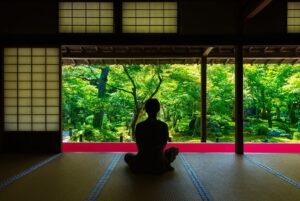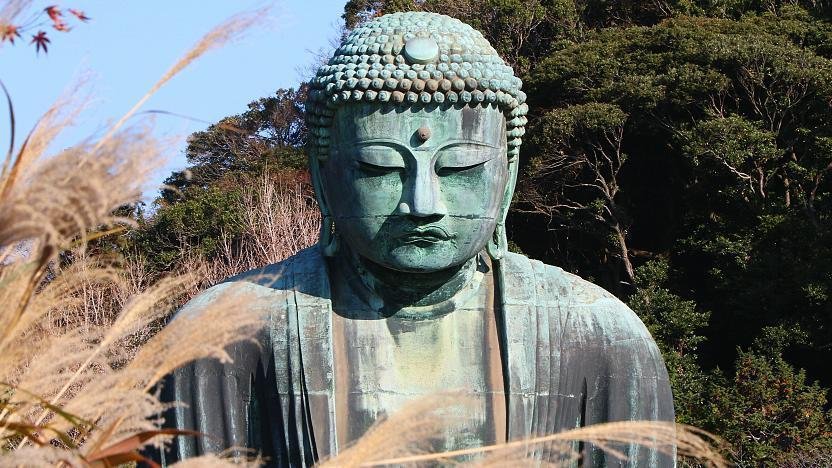Understanding the Influence of Zen Buddhism in Japanese Life
- By -Maria Mash
- Posted on
- Posted in Culture

Zen and Japanese Aesthetics
Zen Buddhism has profoundly shaped Japanese aesthetics, introducing the principles of simplicity, naturalness, and asymmetry that define traditional Japanese art forms. The concept of “wabi-sabi” — finding beauty in imperfection and impermanence — is a direct reflection of Zen philosophy. This aesthetic is evident in various forms of Japanese art, including pottery, tea ceremonies, garden design, and calligraphy. The Zen approach to aesthetics values minimalism and the beauty of natural materials, often leaving items in their raw state or with intentional imperfections to highlight their uniqueness and impermanence. This philosophy has not only influenced traditional art but also modern Japanese design, promoting a sense of calm, balance, and mindfulness.
Zen Gardens: A Reflection of Nature and Mind
Zen gardens, or “karesansui,” are one of the most iconic representations of Zen influence in Japanese culture. These rock gardens, characterized by carefully arranged rocks, gravel, and minimal plant life, are designed to imitate the essence of nature in its simplest form. The act of raking gravel into patterns is seen as a form of meditation, fostering a connection between the physical act and the spiritual mind. Each element in a Zen garden is carefully chosen and placed to represent natural landscapes like mountains, rivers, and islands. The simplicity and tranquility of these gardens reflect Zen’s emphasis on inner peace and contemplation, providing spaces for meditation and reflection that remain central to Japanese spiritual life.
The Tea Ceremony: A Zen Ritual
The Japanese tea ceremony, or “chanoyu,” is another cultural practice deeply influenced by Zen Buddhism. Developed by Zen monks, the tea ceremony embodies the principles of harmony, respect, purity, and tranquility. Every movement in the tea-making process is carefully choreographed to promote mindfulness and a deep appreciation for the present moment. The preparation and drinking of matcha (powdered green tea) are not merely acts of consumption but are considered a form of meditation and a way to cultivate Zen principles. The ceremony’s minimalist setting, often featuring rustic tea utensils and simple flower arrangements, reflects the wabi-sabi aesthetic and emphasizes a return to simplicity and nature.
Zen Influence on Martial Arts
Zen Buddhism has also played a significant role in shaping the practice and philosophy of Japanese martial arts, such as kendo, judo, aikido, and karate. The concept of “mushin” (no-mind) is central to Zen-influenced martial arts, emphasizing a state of mind free from anger, fear, or ego. In martial arts, mushin allows practitioners to react spontaneously and intuitively, without being hindered by conscious thought. This Zen approach to training encourages martial artists to cultivate self-discipline, focus, and inner calm, both in practice and in life. The integration of Zen philosophy into martial arts promotes a holistic development of the mind, body, and spirit, highlighting the interconnectedness of mental and physical mastery.
Zen in Japanese Literature and Poetry
Zen has significantly impacted Japanese literature and poetry, particularly the haiku form. Haiku, a short three-line poem, often captures the fleeting moments of nature and human experience, reflecting Zen’s appreciation for simplicity, mindfulness, and the present moment. The concise and evocative nature of haiku mirrors the Zen pursuit of enlightenment through minimalism and direct experience. Zen principles are also evident in the works of Japanese literary masters, such as Basho and Dogen, who explored themes of impermanence, nature, and the inner journey toward self-realization. Their writings continue to influence modern Japanese literature, emphasizing introspection and the exploration of the human condition.
Zen and Everyday Life in Japan
Zen Buddhism is not confined to religious practice but permeates everyday life in Japan. Its principles encourage mindfulness, simplicity, and a deep appreciation for the present moment. Many Japanese people incorporate Zen-inspired practices into their daily routines, such as maintaining a clean and uncluttered living space, engaging in mindful eating, and practicing gratitude. The Zen concept of “ichi-go ichi-e” — which translates to “one time, one meeting” — reminds people to cherish each moment as unique and unrepeatable, fostering a mindful approach to daily interactions and experiences. These principles are evident in the Japanese approach to life, where attention to detail, harmony, and balance are deeply valued.
Zen Influence on Japanese Architecture
Japanese architecture, particularly traditional structures like temples, tea houses, and residences, is heavily influenced by Zen principles. The use of natural materials, minimalist design, and a harmonious integration with the surrounding environment reflect Zen’s emphasis on simplicity and mindfulness. Elements such as sliding doors, tatami mats, and low wooden beams create spaces that encourage a sense of calm and openness. The concept of “ma” (negative space) is central to Zen-inspired architecture, where empty spaces are as important as filled ones, allowing for a flow of energy and promoting contemplation. These architectural principles continue to inspire modern Japanese architecture, blending tradition with contemporary aesthetics.
The Global Influence of Zen Buddhism
While Zen Buddhism is deeply rooted in Japanese culture, its influence has extended beyond Japan’s borders, particularly in the West, where Zen-inspired practices have gained popularity. The principles of mindfulness, meditation, and simplicity promoted by Zen resonate with modern lifestyles that seek balance, mental clarity, and a deeper connection to the present moment. Zen-inspired practices such as meditation, yoga, and minimalist living have become integral to contemporary wellness trends, highlighting the universal appeal and adaptability of Zen philosophy.
Conclusion
Zen Buddhism has profoundly shaped Japanese culture and daily life, influencing everything from art and literature to architecture, martial arts, and everyday practices. Its emphasis on mindfulness, simplicity, and the direct experience of the present moment has left an indelible mark on Japanese aesthetics and philosophy. As Zen principles continue to inspire people worldwide, they serve as a reminder of the enduring relevance of this ancient tradition in fostering inner peace, balance, and a deeper appreciation of life.



